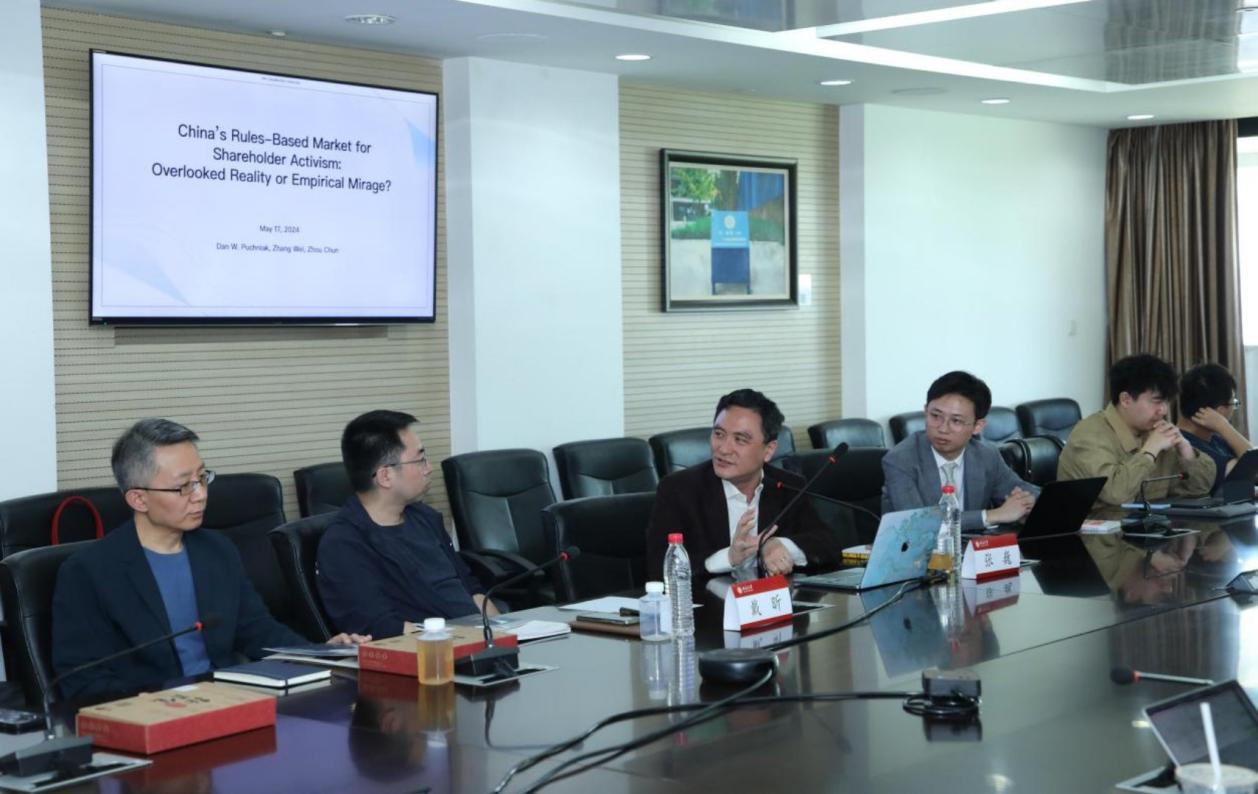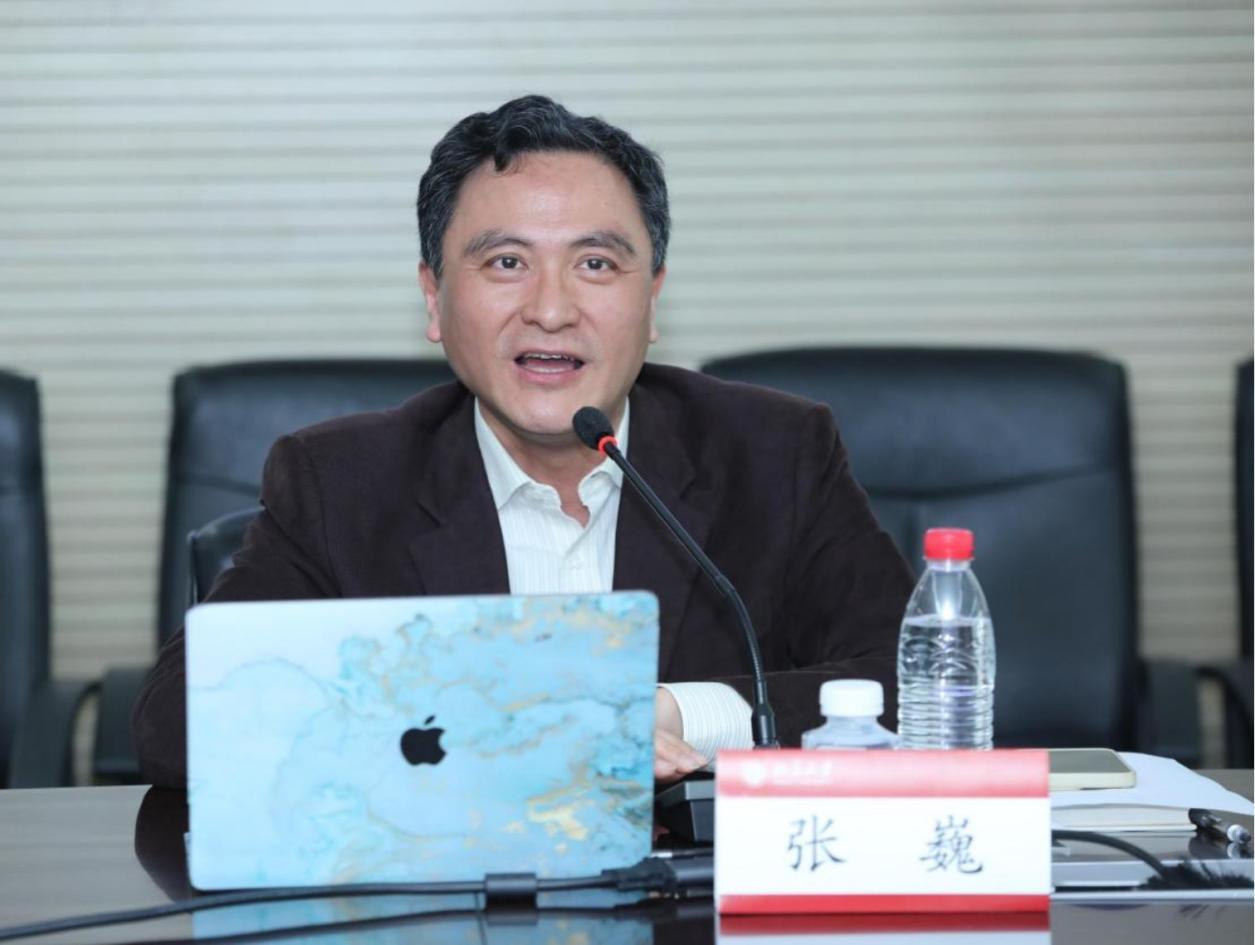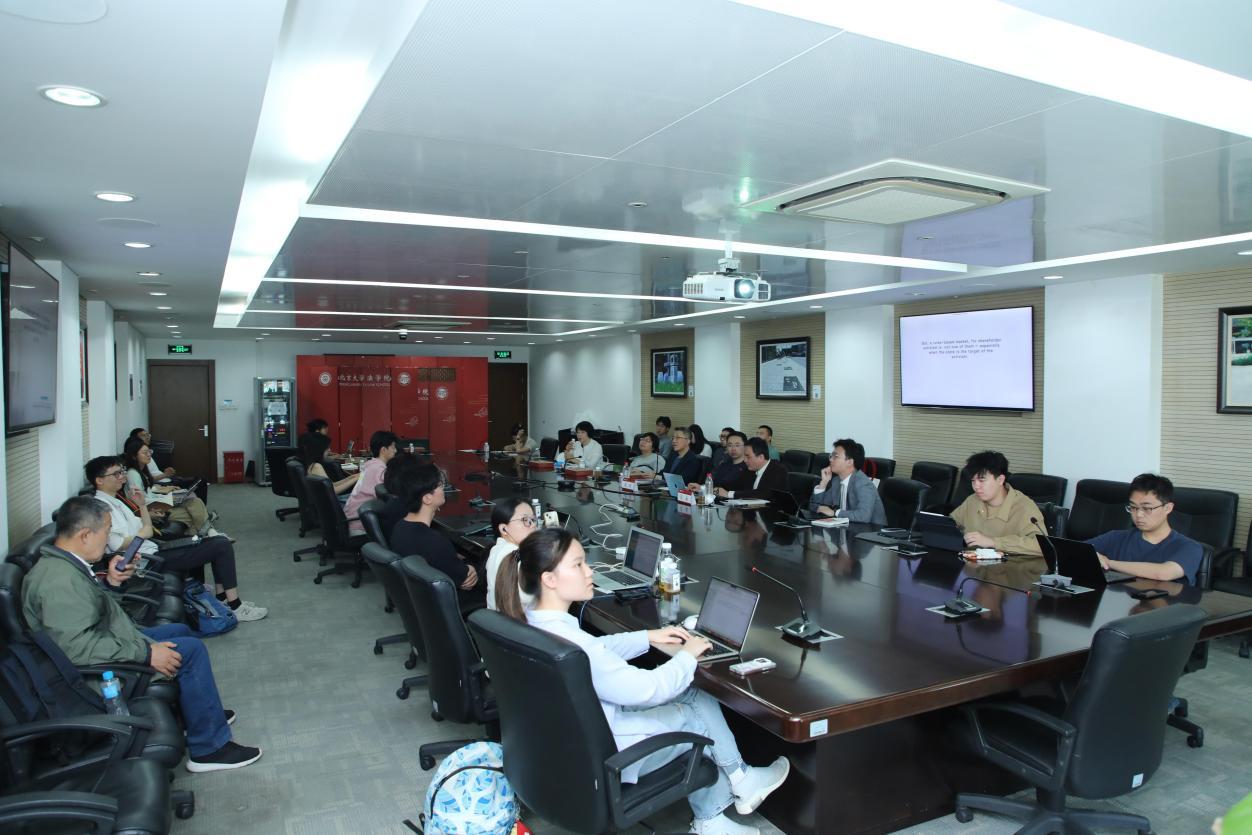Zhang Wei: Rule-Based Active Shareholder Activism in China
Date:2024-11-27

On May 17, 2024, Zhang Wei, Associate Dean and Associate Professor at the School of Law, Singapore Management University, served as the guest speaker for the Globalization and Comparative Law Series Lecture at Peking University Law School, presenting an academic lecture titled "Rule-Based Active Shareholder Activism in China." The lecture was chaired by Professor Dai Xin, Deputy Dean of Peking University Law School; Professor Guo Li and Professor Hong Yanrong served as discussants. Dozens of faculty and students from the university attended the lecture, which was met with a warm response.

Zhang Wei:
Research Background
The theme of this lecture is about active shareholder activism in China, a topic I have been researching recently with Dan Puchniak, Director of the Asian Trade Law Center and Professor of Law at Singapore Management University, and Zhou Chun, an alumnus of Peking University and Associate Professor at Guanghua Law School, Zhejiang University. In my years of research on corporate and securities law, I have observed that some American scholars who study Chinese law have a perception that in China, many things do not need to discuss the law, only political factors. This understanding is different from my own perception of the situation in China. This study aims to explore whether China's legal rules are a "mirage" built on empirical data or a reality overlooked by Western scholars.
Earlier, Professor Zhou Chun sorted out some literature and found that some American scholars believe that shareholder activism does not exist in China; state-owned enterprises (SOEs) will not be the target of shareholder activism; and even if there is activism, SOEs will often win. However, based on previous research, Professor Zhou Chun observed that in recent years, the equity of listed companies in China has shown a tendency towards dispersion, which provides fertile ground for shareholder activism. Therefore, Professor Zhou Chun and her research team conducted data collection on shareholder activism from the end of the 2007 shareholding reform to the end of 2023. My colleague Dan Puchniak, a Western scholar, was very excited when he saw our materials, as he had never heard or seen these things in the Western context.
This research has a considerable empirical component, but the empirical aspect is still some relatively simple data work. It is worth mentioning that extracting data on shareholder activism in China is not easy. Unlike the U.S. securities market regulation that requires disclosure of shareholder activism (13G filing), China has rules for large shareholdings and requires disclosure of the purpose of increases, but the current disclosures of the purpose of increases are relatively simple and formalized (e.g., interested in the company as an investment). Under these circumstances, confirming the existence of shareholder activism is challenging. Our research adopts a relatively strict definition of "shareholder activism," requiring actions that challenge company management and are publicly noticeable. Based on such a definition, Professor Zhou Chun and her team conducted keyword searches on Bing and stock discussion platforms (such as "Xueqiu"), collecting more than 140 cases and finding that since 2019, the number of cases has increased significantly.
Research Methodology
Firstly, this study classifies shareholder activism based on the political nature of both the activist shareholders and the companies, that is: identifying whether the activist shareholders and companies are state-owned enterprises or private enterprises; further dividing state-owned enterprises into central and local state-owned enterprises. After matching, nine models of activism relationships were formed. It is worth mentioning that some scholars have questioned our classification, believing that in practice, private enterprises may also be more politically influenced than state-owned enterprises. However, we believe that, overall, state-owned enterprises have a stronger political color. We assigned values to the political influence factors of both activist shareholders and target companies. Private enterprises have the lowest value (assigned a value of 0), and central state-owned enterprises have the highest value (assigned a value of 2). Then, we calculated the political influence of activist shareholders relative to the target companies in the nine matching models (the difference between the two values) — that is, the political influence score.
Secondly, the study defines what constitutes "success" in activism. The study classified shareholder activism strategies into six main categories: (1) public opinion expression; (2) requesting the exercise of shareholder inspection rights; (3) shareholder temporary proposals. Some American scholars may not recognize this indicator because, in the American context, the conditions for shareholder proposals are very strict, and proposals do not necessarily go to the shareholders' meeting for a vote, but China places great emphasis on the right to propose, and shareholder proposals are binding. The study further divides shareholder temporary proposals into two categories — proposals related to director nominations and other proposals; (4) exercising veto power, that is, requiring a vote against in a majority of the minority (majority of minority) situation; (5) shareholder litigation; (6) tender offers. The "success" of each type of shareholder activism strategy is defined accordingly: (1) the demand is adopted; (2) inspection is allowed; (3) at least one nominated director takes office/at least one proposal is passed; (4) the relevant matter is vetoed; (5) the lawsuit is won; (6) the corresponding proportion of shares in the tender offer is acquired.
Research Conclusions: Quantitative and Qualitative
This study conducted a logistic regression analysis. The analysis data shows that there is no significant difference in the success rate of activism across the nine models. The victory or defeat is not significantly associated with the political score. However, some legal indicators (such as the proportion of shares held) are significantly associated with success or failure. The study includes both univariate analysis and multiple regression, with similar results. At the same time, we found that after 2019, the impact of the proportion of shares held has not changed much, but the influence of return on assets (ROA) has increased.
The above statistical analysis only provides the tip of the iceberg. Below the surface, there may be some indirect influence of politics, so this study also conducted some qualitative case analyses to explore when and in which cases political influence exists. In practice, there are many cases of lip service, such as if a relevant proposal is not passed, the company will continue to convene shareholders' meetings for review. However, such events occur in all types of companies, not just those with high political factors, and this precisely shows that legal rules are important — companies care about conforming to legal rules in form.
From the cases, it can be seen that political factors and influences have more or less impact on shareholder activism in China. However, political factors also exist in American corporate governance, just to a different degree. During the financial crisis, when Bear Stearns was acquired by JP Morgan at a low price, shareholders once took the matter to the Delaware Court, but the Delaware Court refused to accept it on procedural grounds, which can also be interpreted as a consideration of political factors such as bailouts.
Commentary Session:

Hong Yanrong: Today's lecture uses practical cases to explain the operation of China's market economic rules, which is a very interesting study. Regarding the dividend issue mentioned in the research, I have some supplements. In China, a large part of state-owned enterprises cannot reduce holdings due to control considerations, but based on the preservation and appreciation of state-owned assets and other comprehensive considerations, dividends must be paid. Therefore, regardless of whether small shareholders advocate for dividends, they often pay a large proportion of dividends, which may not necessarily coincide with the operating wishes of the listed companies.
Another interesting issue is the identity of institutional investors. In the past, we regarded institutional investors as financial investors, but in recent years, ESG funds and others have begun to take active actions. State-owned enterprises enter into guiding funds as LPs, and then the guiding funds invest, with state-owned LPs affecting the GP's choice of investment targets. In addition, from a legal rule perspective, many are replaced by legal强制手段 instead of market choices, such as cumulative voting and the holding and rights exercise of 100 shares in each listed company by the Investment Service Center. This is a very interesting topic, and I thank you for conducting such an enlightening study.
Question and Answer Session:
Question 1: I have three questions: The first question is about the narrative of the article. Has the Western mainstream paradigm already included the issues this study wants to discuss? For example, there are already studies discussing that we are mainly opening up economically according to rules, especially after 2018, basically recognizing that our general direction is to strengthen the rule of law, but legitimacy is based on a set of Chinese characteristics. The second question is about the micro-mechanism of the research. The regression analysis or empirical studies we do now can only solve the problem of correlation, but how does the political factor work? Does it cause the action to be unable to be carried out, or carried out but unable to succeed? The above questions may not be explained. The third question is about the illustrative issue of the sample. The samples you collected from the internet have already been screened, and if there is really a political force, maybe private actors cannot propose motions at all, or cannot take any action, which leads to the collected samples may not illustrate your conclusion.
Zhang Wei: Regarding the first question, maybe you are referring to literature in political science or economics, and if so, I agree with your point. But such perspectives are rarely seen in legal literature, such as the views of the researchers I mentioned in the literature review, which are more politic
Translated by: Cheng Mengli
Edited by:Liang Xiaomeng



